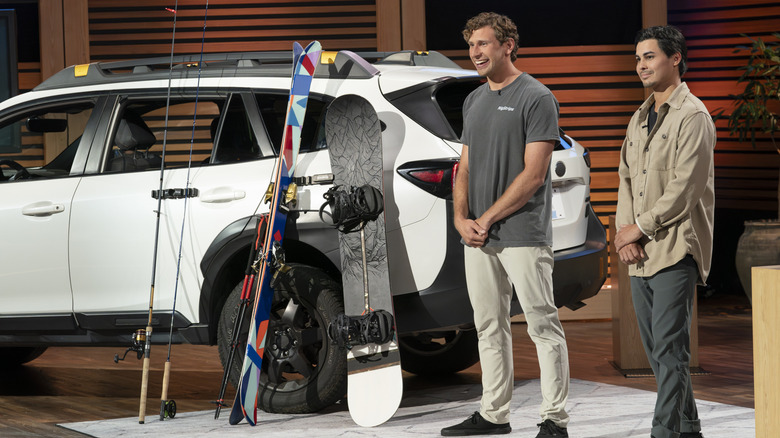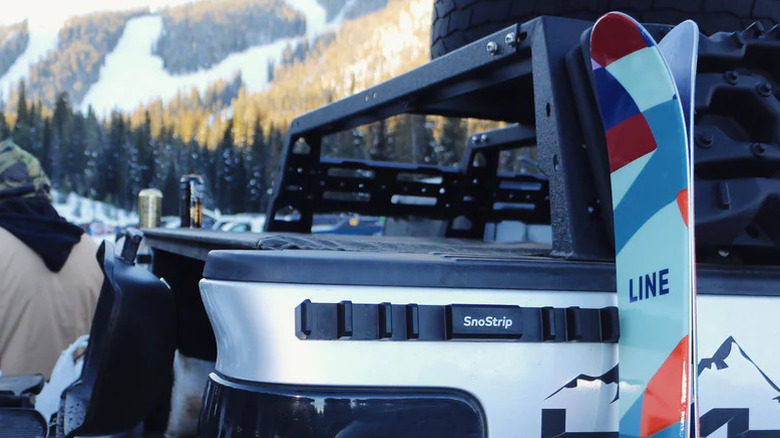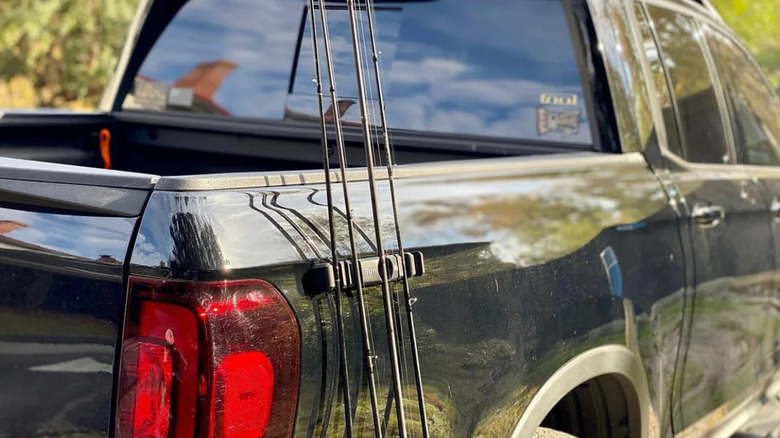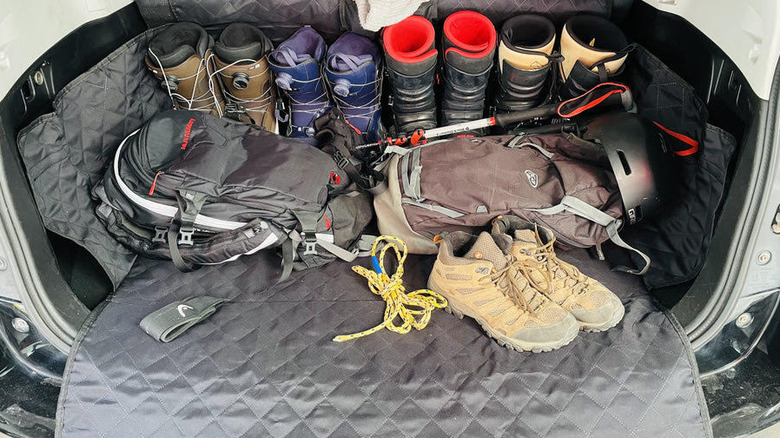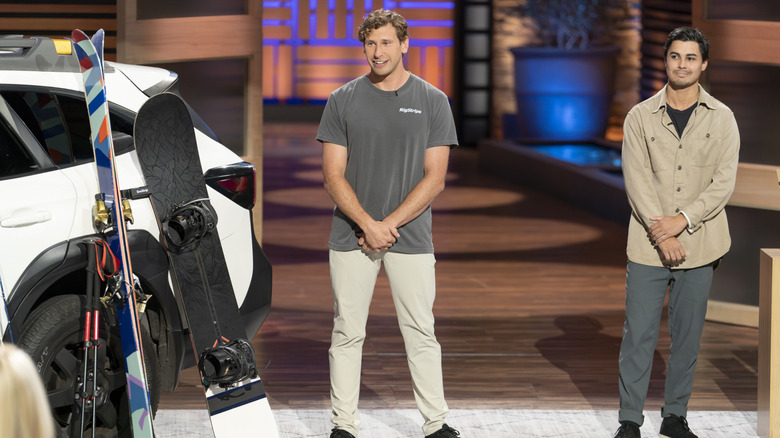What Happened To RigStrips From Shark Tank Season 16?
We may receive a commission on purchases made from links.
When Steven Graf and Zhach Pham unracked their skis for an incredible day of shredding powder at the Keystone Ski Resort five years ago, they had no idea that they were taking the first step on their entrepreneurial journeys. Leaning their skis against the paint of their car, they heard the clatter of their new equipment sliding across car paint and crashing to the ground. Hours later, on the back of a bar receipt, the first product of their future company was born: A strip attached to the side of your vehicle, perfect for holding your snowboard or skis.
The duo, who said that they "were always making things" since they first met in the second grade, fashioned the SnoStrip in just a few months. By popular demand, they added a summer version soon after. In the four years following, they sold more than 60,000 units, totaling $3 million. While this isn't bad for a couple of outdoorsmen looking to make their skiing trips more enjoyable, Graf and Pham wanted to take their business to the next level. So they appeared on Season 16 of "Shark Tank," hoping to prove that their invention was a gadget your next skiing trip couldn't go without.
What happened to RigStrips on Shark Tank?
When Pham and Graf stepped onto the "Shark Tank" stage, they brought everything the Sharks usually look for: A patented product, a demonstrated place in the marketplace, strong financials, and clear expectations for a potential partnership. In particular, the Sharks were impressed by the duo's sales numbers, including a projected $2.7 million in 2024. Kevin O'Leary, inquisitive as he is, couldn't help but ask, "Has it changed your life yet?" Graf revealed that the two ratcheted $450,000 of profit in 2023 alone. As Mark Cuban exclaimed, "Not bad for a bar idea, huh?"
RigStrips' only hiccup came in seeking $300,000 for a 7.5% equity stake, pricing their self-evaluation at $4 million. The Sharks collectively balked at this number, with O'Leary predicting that turning a profit would be like squeezing "teenage pimples." Luckily for the former classmates, they had a friend in Guest Shark Todd Graves, founder of the lucrative fast-food franchise Raising Cane's.
Citing his own experiences as an outdoorsman, Graves sensed the utility of the RigStrips product from the start. The partnership also seemed ideal from a functional perspective, as the duo needed an expert marketer with the cash to scale inventory. Graves made his case to the RigStrips team, saying in his patented Louisiana drawl, citing his humble beginnings printing car flyers at Kinko's. Finally, after some haggling, RigStrips and Graves settled on $300,000 for a 15% stake, to raucous applause.
RigStrips finds success afterwards
Unsurprisingly, the partnership has been incredibly fruitful for RigStrips in the short term. According to its website, the Denver-based company has sold over 20,000 units since its appearance on the show — roughly a third of its total sales for the previous four years combined. Not only that, but the RigStrips' flagship product — the SnoStrip — has sold out six times throughout the company's brief history.
The recent growth probably hasn't surprised its founders, as Graf noted in their Shark Tank pitch that 62% of the company's sales occur in November and December. With that being said, moving an additional 20,000 units in three months outpaces even their most optimistic projections. Such success has warranted a flurry of media attention, with publications like Men's Health, Outside Magazine, and CNN all featuring its products.
Although it's difficult to gauge the degree to which RigStrips' success is related to its appearance on "Shark Tank," it's clear the two founders were pleased with their new partnership. As Pham stated in an interview with BusinessDen, "Todd was pretty much the reason we were on the show." Much of their interest in Graves was Raising Cane's college football roots. As Graf put it, "There's that element of tailgating with RigStrips ... having a beer at the end of the day ... and Cane's having roots in tailgating is something we hope to blend."
Nowhere is this more evident than in RigStrips' third magnet-based product: A koozie that applies the same technology to keep your beverage cold and upright on your car door.
Rave reviews hint at future success
Much of RigStrips' success can be attributed to the same reasons Graves was so eager to invest in them: Their products address a clear and common problem for adventurers. Take its patented SnoStrip, for example. Featuring snowboard hooks and thinner skiing slots, the 16-inch rubber strip is waterproof, accommodates multiple sets of snow gear at a time, and is attached via a magnetic strip that withstands highway-level speeds while remaining easy to remove. The company also offers an adhesive strip option for drivers of aluminum vehicles like the Ford F-150.
The SunStrip, for its part, is an ideal gadget for your next fishing trip. Fitting up to seven rods, the SunStrip provides many of the same features as its winter cousin. However, a benefit of this version is its functional flexibility — the SunStrip's slots can also fit rounded bike handles and firearms with a barrel diameter of twelve gauges or less. Unfortunately, RigStrips' website does not feature an adhesive option for the SunStrip at this time.
Users have given rave reviews for each of the company's strip products. On the company's website, for example, both the SnoStrip and SunStrip possess an average rating of 4.7 or higher. Nearly 90% of the products' reviews give 5-star ratings, totaling 311 combined. RigStrips has found similar success on Amazon, where the SnoStrip and SunStrip sport 4.4 and 4.3 ratings, respectively — across nearly 500 reviews. At $49.95 including shipping, it's no wonder RigStrips has found success since appearing on "Shark Tank" in October.
Catering to the entire outdoors experience
In addition to its magnetic and adhesive strip products, RigStrips expanded its offerings to include other adventure gear solutions for your vehicle. For adventurers worried about dirtying their cars, RigStrips sells the TrunkGuard, a waterproof mat that clips right into the back of your headrests. Sitting 41 inches wide and 44 inches deep, the TrunkGuard protects the bottom and sides of your trunk and includes a fold-out tailgate cover.
For when you get out of your vehicle, RigStrips offers the RigStrip Lot Mat, a portable 24x18-inch floor mat designed to help adventurers change into their gear of choice, be it snowboard boots, wetsuits, or hiking shoes. Outdoorsmen who are tired of transporting all their gear by hand can throw it into RigStrips BFT, a 100 liter tarpaulin waterproof shoulder/tote bag. For the end of the excursion, RigStrips provides its grab-and-go collapsible MudBucket, capable of holding up to 90 liters of dirty shoes, helmets, waiters, etc.
With these products, RigStrips attempts to make the transportation and storage of your adventure gear as clean and painless as possible, offering a comprehensive suite of merchandise that gets you to and from your excursion without bringing the mountain back with you.
What's next for RigStrips' founders?
So, what's next for Pham and Graf? Despite the success of RigStrips, the two friends have already embarked on a new joint venture, founding Spark Sponsor in 2023 with the company's CTO, Garrett Clark. A data analytics firm servicing event sponsors, Spark Sponsor offers a comprehensive web platform that enables sponsors to record, track, and analyze the impact of their advertisements. According to Spark Sponsor's website, the firm creates "virtual swag bags" with customizable promotional materials for events to share with their partners. Sponsors then customize and share these materials, track their engagement, and receive personalized feedback.
Spark Sponsor is the latest evolution of the duo's social commerce marketplace, Flowcart, which Pham stated in a LinkedIn post was born directly from their experience marketing RigStrips. "Over the past few years of running an outdoor brand," he wrote, "we noticed that the process of partnering with creators, influencers, and athletes left a lot to be desired. After we determined that a new partnership was a good fit, the next question was usually: 'Now what?' We weren't happy with what was out there, so we built Flowcart."
Despite being a new venture, its website already sports several big-name clients, including the Los Angeles Marathon, the cross-country skiing race Slumberland Birkebeiner, and the Outside Festival and Summit. In 2024, this success led to an investment from Wildwood Ventures, a Denver-based venture capital firm focusing on the "intersection of the outdoor and wellness economies." Wildwood Ventures is backed by VF Corporation, the parent company of popular brands like The North Face, Timberland, and Vans.
